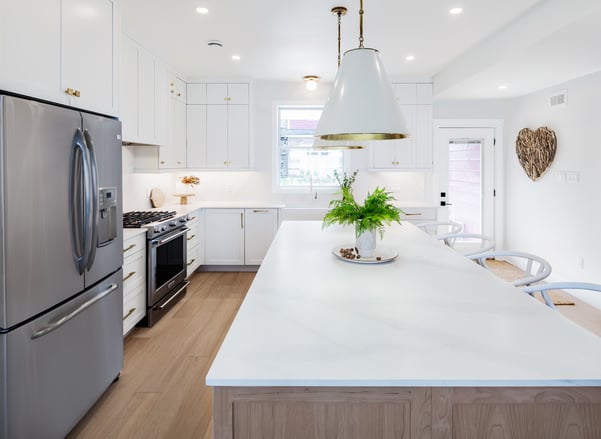2/08/2022 • Blog, Product Reviews
Quartz vs. Quartzite: Comparing Countertops
Estimated Read Time: 6 Minutes
Deciding on the perfect countertop for your kitchen can be an arduous task, with so many options to choose from like laminate, stone, wood, and even metal. Add in the large investment you’re making, and selecting the right countertop becomes even more stressful.
That’s why we’re here to help!
At Deslaurier Custom Cabinets, we have over 40 years of experience providing custom cabinets and kitchen design services to our customers. While doing so, we partner with a number of Ottawa’s most reputable countertop suppliers, like Urban Quarry, to help our clients customize the kitchen surfaces of their dreams.
Take quartz and quartzite, for example. While often confused for one another, they’re both wildly popular choices for kitchen countertops, and may be just what you need to put the finishing touches on your home!
This article will break down everything you need to know about quartz and quartzite countertops in order to help you decide which surface is right for your dream kitchen.
Let’s get started!
|
Table of Contents |
|
What are Quartz Kitchen Countertops?
|
What are Quartz Countertops?
Prospective buyers often get confused when researching quartz countertops because they come across as seemingly contradictory adjectives, like “natural” and “man-made.” The truth is, both of these adjectives apply to quartz.
When it comes to countertops, quartz falls under its own hybrid category. Quartz itself is a mineral in the earth, but quartz countertops are not considered natural stone like granite or marble.
Technically, quartz is an engineered stone countertop, meaning that while 93% of the surface is pure quartz material, the remaining 7% of the stone is manmade.
Essentially, what fabricators do is grind up the quartz mineral and glue it back together with polymers and binders. These man-made components bind with the quartz to create an ultra-durable, non-porous surface that doesn’t require resealing.
During the manufacturing process, sometimes fabricators will add tiny flecks of glass or metals, or combine pigments with the quartz to create extra visual appeal.
Quartz Kitchen Countertops: Appearance
The design process is an extremely valuable tool when selecting the right countertop style. Your designer will help you decide what pattern or shade is best suited for your kitchen’s design and budget.
Quartz’s engineered fabrication process translates to endless style options. Since additives like pigment and resins are combined with quartz aggregate in the factory, manufacturers can create a full spectrum of aesthetics. You’ll find quartz in a wide array of colours, patterns, and textures.

Countertop fabricators often have room to get creative when forging quartz-resin mixes. Manufacturers can incorporate semi-precious stones into their slabs or create a selection of hundreds of unique colours and patterns.
All of these designs can be cultivated to look uniform and consistent, unlike pure stone countertops which have natural veining and colouring that cannot be altered.
Using this method of manufacturing, fabricators are able to manipulate quartz to mimic the look of natural stones, like marble. Since marble is a luxurious, soft stone, this allows quartz to provide a cost-effective and more durable imitation of an expensive marble countertop.
Quartz Kitchen Countertops: Durability
The clear advantage of quartz countertops over natural stone countertops, such as granite and marble, is that quartz is non-porous.
The 7% resin portion of the quartz countertops effectively acts as a sealant. That means you don’t have to worry about routinely resealing your quartz surface, which is an additional cost required for natural stone countertops.
Not only that but being non-porous makes quartz countertops extremely stain-resistant. You don’t have to worry about a cooking mess or red wine spill getting soaked up by the surface.
Another benefit to being non-porous is that it’s harder for germs and bacteria to penetrate the countertop. Quartz is antimicrobial, making it that much easier to keep your kitchen sanitary.
Also, unlike some natural stones like marble, quartz does not etch. Etching refers to surface damage that occurs when acids, like lemon juice or vinegar, are exposed to the surface and begin to dissolve within the stone, causing permanent stains.
Conversely, the biggest maintenance-related drawback to quartz is that it's not heat-resistant. You can’t put down a hot pan or pot directly onto a quartz surface without running the risk of making permanent scorch marks.
Quartz Kitchen Countertops: Cost
Determining the cost of quartz, or any other stone countertop, is not an exact science. There are a number of uncontrollable variables that may affect the price of natural materials from one month to the next, or supplier to supplier.
The price of quartz can be influenced by quarry location, shipping costs, manufacturer, and supply and demand.
So, how much are quartz kitchen countertops?
According to the Ottawa supplier Urban Quarry, depending on the quality of the product, the average cost of a quartz countertop falls between $80-$180 per sq. ft., not including installation fees.
This could wind up being anywhere from $2,000 to $10,000, depending on the amount of countertop space you have, and the quality of quartz selected. If you intend on furnishing multiple surfaces in the kitchen, including wall backsplashes, the total cost can exceed $20,000.
Keep in mind that these prices do not assume the cost of installation. A standard countertop installation, with no cutouts, could cost anywhere from $300 to $600. Once cutouts and other maintenance are factored in, installation can cost well over a thousand dollars.
What Are Quartzite Countertops?
With such similar names, quartz and quartzite often get confused with one another. It’s very important to differentiate between the two, as they both have many unique distinctions.
The primary difference between the two is that, unlike engineered quartz, quartzite is a natural hard stone countertop.
Funnily enough, quartzite is actually made almost entirely of…quartz!
Quartzite begins as sand grains and quartz minerals become compressed together to create a metamorphic rock, sandstone. As it gets buried deeper underneath the earth, getting hotter and more compressed, the grains fuse together to form a dense, durable stone: quartzite.
Something to be critical of is the mislabeling of “soft” quartzite. There is no such thing as soft quartzite, as it is exclusively a hard stone formed in the earth. If something is mentioned as “soft” quartzite, it is most likely marble being mislabeled.
Quartzite Kitchen Countertops: Appearance
While quartz countertops flourish when it comes to creative and customizable style choices, quartzite is slightly more limited in its appearance. Since they’re a natural stone, their appearance can’t be manipulated in the same manner as quartz.
But not to worry, quartzite has some of the most beautiful natural stone kitchen countertops you can find!
Quartzite countertops generally come in varying shades of white and light grey, due to quartz sand being light in colour.
That’s not to say quartzite are all alike. During quartzite’s formation process, it is not uncommon for additional minerals carried by groundwater to add various hues of green, blue, and even red, to quartzite!
Not only that, quartzite has natural veining that the quartz manufacturing process removes. This veining can present itself as large, dark streaks, or gentle, subtle patterning.
Quartzite Countertops: Durability
For the most part, many of the same qualities of quartz ring true for quartzite countertops. They are extremely hard and strong, are stain-resistant, and do not succumb to etching.
One immensely beneficial characteristic of quartzite is that it is heat-resistant. Especially when working in the kitchen, you can put hot pots and pans directly on the surface of a quartzite countertop without damaging it.
After that, quartzite is a little trickier to pin down than quartz.
For starters, not all quartzite countertops are the same. Due to their natural formation process, quartzite can have varying amounts of porosity. Essentially, quartzite countertops can be found as porous and nonporous selections.
It all comes down to how much pressure the individual quartzite has succumbed to. Quartzite that has experienced high pressure will have tightly bonded minerals and be a nonporous countertop. Those that have been exposed to less intense pressure will be more porous and would benefit from sealing for added protection.
The best thing to do is ask your supplier. Or, if it’s not an extremely rare quartzite countertop, you can ask for a sample that you can then have tested for you!
Quartzite Kitchen Countertops: Cost
In the broad sense, expect to pay anywhere from $80 to $200 per sq. ft. for quartzite countertops. Of course, just like with quartz, the prices will vary immensely depending on slab selection and the supplier you purchase it from.
White quartzites that are commonly found at most countertop suppliers will be in the range of $80 to $120 per sq. ft. More rare or “exotic” quartzite slabs can reach up to $200 per sq. ft. or even more.
Visiting large stone yards or showrooms will aid you in finding the best countertop for you by comparing the selections and price ranges of different countertop suppliers.
Design with Deslaurier Custom Cabinets
If you’re looking to pair custom cabinetry with the perfect quartz or quartzite kitchen countertop, Deslaurier Custom Cabinets has everything you need.
We bring 60+ years of experience to the table and partner with a vast network of premier countertop suppliers. The result? We consistently leave a long trail of customized, high-performance kitchens in our path.
We provide our clients with a fully customized design process with our talented team of designers. Book a consultation for a one-on-one with a Deslaurier kitchen expert virtually or in-person at our Jupiter, Florida showroom!
Interested in becoming an authorized Deslaurier dealer? Visit our Become a Dealer page to learn more! Live outside the area? Find a Dealer to connect with a Deslaurier dealer near you!


